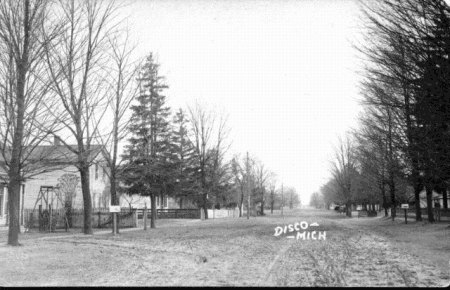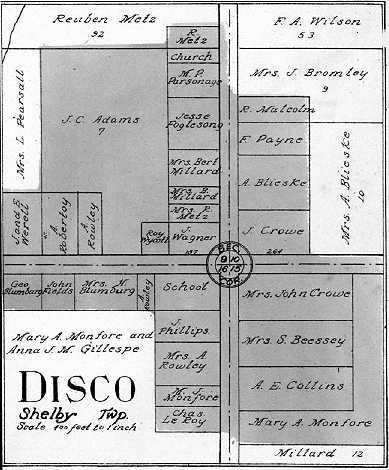|

A few old homes and a namesake on county road
maps is all that is left to remind us of this once thriving community.
In the early 1830's settlers mostly from New
York cleared land and built log cabins on the corners of sections 9,10,15 and 16 of Shelby Township. They referred to this
area as the " Utica Plains ".
The village of Disco was platted in 1849 at the intersection of 24 Mile (Whiskey Road)
and Van Dyke. The name has two possible derivations: 1) from the Latin "Discare": to learn, or 2) District of Columbia.
Disco
consisted of two general stores, three wagon shops, two blacksmith shops, one harness shop, one paint shop, and a hotel called
the Halfway House. There was also a resident physician. The principal industries were a wooden bowl factory, feed mill, cider
mill and planing mill.
Disco had daily mail with Mrs. J. Satler as Postmaster. It was the halfway stagecoach stop
on the Concord Coach Line carrying mail and passengers from Royal Oak to Almont.
Issac Monfort, Chauncey Church and
John Noyes, encouraged by the success of the Romeo Academy, set aside 10 acres of land and $1,000 for a place of higher learning.
A two-story school opened in 1850 as the Macomb County High School. Alonzo M. Keeler was principal, a post he held until 1864.
The purpose of the facility was to prepare young men as teachers. It was renamed the Disco Academy in 1855. The building burned
in 1880 and was replaced.
During 1890 an ownership controversy developed between the Disco Literary Society and the
Shelby School District. The School District, users of the building for 53 years, became the sole owner upon payment of $400
to the Literary Society.
Two buildings eventually existed as part of Shelby School # 6. Movies were shown in the back
of one of the buildings. The last remaining building was moved three times, eventually resting behind the " new " Disco Elementary
School. It has since been torn down.
The larger of the two buildings was used by religious groups. The lower floor
was used by school trustees, the upper floor by the Methodists and later by the Congregationalists. The first Disco Methodist
Church was built by Orestes Millerd, who settled in Shelby in 1827. In 1890 the Hope Methodist Church was started.
The
Mennonites moved into the Disco area in the late 1800's. The Mennonite Church was located on the south side of 23 Mile east
of Shelby Road. It was a church until the early 1930's. In 1988 it was reconstructed into a home and moved a little further
east and to the north side of the road.
During Prohibition, the current McClenaghan's, formerly known as Ichabod's
Bar south of 24 Mile on Van Dyke, served as a blind pig called the Yellow Canary. Disco was known as Whiskey Center. A half
barrel of beer was obtainable from a Utica distillery for $8.00. Something that perhaps was more then a casual pastime as
suggested by this Disco nickname.
SOURCES: Deborah J.Remer, Lost Villages, Small Towns and Railroad Stops in Oakland
and Macomb County: Leeson, History of Macomb County : Michigan Pioneer and Historical Collection 1874-1912
DISCO PHOTO ALBUM

|

